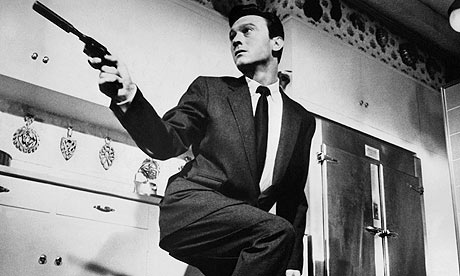
At any one time there will always be a TV drama that everyone is talking about, and just at the moment it's the American show Homeland, a paranoid soap opera about a US Marine Corps sergeant who is sensationally discovered by American forces walled up in a dungeon in Baghdad having heroically defied his captors for eight years. He is brought home to the United States, an instant hero. But a psychologically troubled and overworked CIA agent has a hunch that this man has in fact been "turned" by al-Qaida, and that this all-American wonderboy is now a sleeper agent biding his time, using his celebrity to insinuate himself back into the military machine at a higher level, before perpetrating a new Islamist outrage on US soil. The sergeant is played by Britain's Damian Lewis, the agent by Claire Danes and the ambitious CIA deputy director is David Harewood.
Homeland-upmanship is now growing among the media classes, some of whom are not shy of letting the rest of us know they have seen the entire first season in the US. I myself am just up to episode three, in line with the UK terrestrial broadcast, but was nonetheless hoping to score a few Homeland-upmanship points by virtue of having talked about the programme with David Harewood himself in the BBC Breakfast green room – he was going on to talk about getting an MBE. However, this paltry effort has been aced by my colleague Jonathan Freedland, who has written a brilliant article about the Israeli TV show on which Homeland is based.
Well, I still think there's something that hasn't been discussed enough. And that is the fact that Homeland is not solely based on an Israeli television drama — it's also inspired by the 1962 John Frankenheimer movie The Manchurian Candidate, about a decorated Korean war veteran who comes home having been brainwashed by the communists and primed to assassinate the president. Homeland actually woke me up to an important buried meaning in that movie, which I didn't realise until watching this show.
Jonathan Freedland rightly points out that the most sensational moment in Homeland (at least so far) is when we see Sgt Brody secretly begin the Muslim's traditional morning prayers in his garage. It is a moment which provokes and yet challenges our instinctive shock — isn't this proof of his perfidy? No. There are millions of patriotic American Muslims. Might he not, during his eight-year ordeal, have chanced upon the beauty and contemplative calm of Islam, and found some spiritual comfort in it, while remaining an impeccably patriotic American?
Homeland very much resembles dramas such as The Wire and The Sopranos in that it is about a group of people who are under surveillance, giving an extra frisson to our own viewing experience and intensifying the drama of these eavesdropped-upon lives. In The Manchurian Candidate, the experience of being televised is deeply important: appearing on a television screen one is intensely scrutinised and exposed, and yet the spectacle is also an imposture. The Manchurian Candidate, I always thought, is very similar to the cult 1960s TV show The Prisoner (which of course came later) — just as the weird opening titles to Homeland, with the strange maze images, are also somewhat Prisonerish.
To continue the Sopranos analogy for a moment, Sgt Brody begins a touchingly and unexpectedly gentle friendship with his eldest daughter, very like Tony and Meadow Soprano, and the spectacle of the scantily clad women employed by the mysterious Saudi potentate cunningly suffuses the drama with a kind of porno-sexiness, like the dancers at Tony Soprano's Bada Bing club.
The most pointed line comes from Harewood, the CIA chief. He is insistent that the US must keep its guard up (though without suspecting Brody) and most agitated by the thought that everyone in the country, both civilians and in uniform, is somehow under the impression that the war on terror is over and everyone can relax. It is a fascinating idea: that America is coming to terms with the waning of a great – or at any rate greatly dramatic – era: the 9/11 era. Of course, anti-US hatred and anti-US terrorism is a continuing issue, especially considering the new tension with Iran. Guantánamo Bay detection camp is still open for business and the tragically misconceived military adventure in Iraq continues. But it could be that we are all daring ourselves to believe the main event is at an end.
Well, in horror movie terms, the lull at the finish is precisely when the monster makes its final attack – when the hand shoots up out of the grave. And that is where Sgt Brody comes in, with his much-feared final plan to destroy America.
This could be the meaning of Homeland, a mischievous satire on Obama-era complacency. But I think it is something else, and this applies to The Manchurian Candidate too. It is rather that Sgt Brody symbolises the spores of scepticism and discontent, the mixed and complicated freight of doubt and disillusion, being carried back to the US en masse by the returning troops. They are a body of people who have accumulated unique, eyewitness connection with a foreign land, a more potent connection than that of any diplomat, think-tank adviser, journalist or intellectual. They may well have been "turned" in some indistinct way. And it is only in the drawdown period, the late phase of homecoming – so dangerous in the CIA chief's view – that their opinions and feelings will be introduced into the American bloodstream.
In 2004, a remake of The Manchurian Candidate was released, directed by Jonathan Demme. It was pretty disappointing, perhaps at least partly because the time wasn't right. It's only now, in 2012, that this story could be effectively retold, and not by a film but a TV drama.

